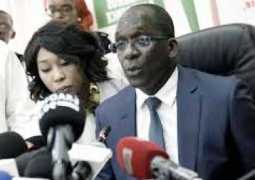Recently Magistrate Jobarteh, chairman of the Kanifing Industrial Tribunal, entered judgement in favour of Emmanuel Ina George, who dragged Prime Bank, his former employer, to the tribunal for unlawful dismissal.
Emmanuel Ina George, the plaintiff, had claimed three years of basic salary for unlawful dismissal, bonus entitlements for the trading periods July 2009 to September 2010, general damages for breach of contract and interest at the rate of 25 per cent per annum from 13 July 2009 to date of judgement and thereafter statutory interest of 4 per cent to date of final liquidation and cost.
Magistrate Jobarteh, in delivering his judgement, said the tribunal was in agreement with the plaintiff’s counsel that the burden to be discharged was on the defendant as the dictum of Section 90 (2).
He stated that the defendant must bring forth evidence to show their existed fair and principal reason necessary to dismiss the plaintiff as well as following a proper hearing procedure before dismissal.
He further posited that the issues to be determined were: whether the plaintiff performed his duties contrary to instruction despite repeated warning; whether the plaintiff executed foreign currency transaction without prior authorisation despite repeated warning, and whether the plaintiff executed strange and abnormal foreign exchange with an unlicensed foreign exchange dealer and also granted COT confession without authority.
Magistrate Jobarteh said he would disregard communications contained in exhibit D1and D2, and 7a-c for being overtaken by the leverage granted to the plaintiff by the defendant as per exhibit E.
He adduced that going by the most salient part of exhibit E (a letter) in which the writer from the bank stated that with immediate effect, the plaintiff was granted the liberty which he had requested for to enable him to perform his duties in line with the job description that he had signed.
Still delivering the judgement, Magistrate Jobarteh stated that this served as both an assurance to the plaintiff and an acknowledgement of interference by the management in the performance of the duties of the plaintiff.
“This is why exchanges that have taken place between the parties before the advent of exhibit E are no longer relevant to the later decision of the bank to dismiss the plaintiff because the principal reason for the dismissal is anchored on the transaction in the defendant exhibit 2,” Magistrate Jobarteh told the tribunal.
“I believe that exhibit E has opened a new leaf or clean slate between the two parties, although the same contract of employment has remained.”
He further indicated that on the first issue, the onus of proof was on the bank to lead evidence on the transactions executed by the plaintiff contrary to the instructions.
He said the first witness of the bank throughout her evidence-in-chief did not allude to any single instance in which the plaintiff acted contrary to instructions.
“Under cross-examination, the plaintiff further revealed that between 10-24 September he bought US$500,000 from the customer signed by the authorization signitories of the bank. Therefore the failure of the bank to produce the content of foreign exchange contract file to either contradict or establish the truth of the plaintiff’s assertion is a blow to the bank,” said Magistrate Jobarteh.
He said further that the foreign exchange contract file had existed and the transactions which were put in the system were accompanied by hard copies, which were surprisingly missing.
The tribunal could not understand why the bank did not call in the evidence of the MD, he said, adding that his name had resonated throughout the evidence of the plaintiff and the defendant witnesses.
He stated that his testimony would have resolved doubts about some issues.
“Therefore, even if the defendant wants the tribunal to believe that the plaintiff had always executed deals without instructions, it has failed to proffer enough evidence to elucidate the defendant’s belief,” Magistrate Jobarteh said.
He further adduced that the plaintiff had exhibited both his letter of appointment and contract of employment to show that it was part of his responsibilities to buy and sell foreign currencies and negotiate foreign exchange rates with customers.
Magistrate Jobarteh said the plaintiff claimed that after a meeting between him and the MD and Head of Finance, he executed many deals which were approved by the bank.
“As a matter of fact, the claim of the plaintiff that by September 2010 he had already achieved the target of D4 million, was not challenged,” said Magistrate Jobarteh.
He further stated that the execution of defendant exhibit 2 in a manner executed by the plaintiff could not amount to misconduct as alleged by the bank because the second witness of the bank in her evidence stated that the transaction generated profit to the bank.
In conclusion, Magistrate Jobarteh said that considering the fact that the plaintiff had worked for the bank for only about 16 months, the tribunal would award payment of six months as basic salary.
Cost of D15,000, interest at the rate of 17 per cent award sums from 13 July 2009 to date of award and interest at the rate of 4 per cent on the award sums from the date of award to date of payment were awarded to the plaintiff.
The tribunal ordered the defendant to pay the plaintiff one month’s salary in lieu of notice and 6 days leave owed to the plaintiff.
Lawyer Moses Richards represented the plaintiff while Lawyer Loubna Farage stood in for the defendant.
Panelists Cole and Njie assisted Magistrate Jobarteh, the chairman.




